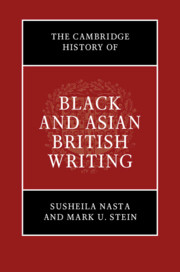Book contents
- The Cambridge History of Black and Asian British Writing
- The Cambridge History of Black and Asian British Writing
- Copyright page
- Dedication
- Contents
- Notes on Contributors
- Preface and Acknowledgements
- Introduction
- Part I New Formations
- 1 Narratives of Resistance in the Literary Archives of Slavery
- 2 Writer-Travellers and Fugitives
- 3 Exoticisations of the Self
- 4 Black People of Letters
- 5 Engaging the Public
- Part II Uneven Histories
- Part III Writing the Contemporary
- Select Bibliography
- Index
4 - Black People of Letters
Authors, Activists, Abolitionists
from Part I - New Formations
Published online by Cambridge University Press: 19 December 2019
- The Cambridge History of Black and Asian British Writing
- The Cambridge History of Black and Asian British Writing
- Copyright page
- Dedication
- Contents
- Notes on Contributors
- Preface and Acknowledgements
- Introduction
- Part I New Formations
- 1 Narratives of Resistance in the Literary Archives of Slavery
- 2 Writer-Travellers and Fugitives
- 3 Exoticisations of the Self
- 4 Black People of Letters
- 5 Engaging the Public
- Part II Uneven Histories
- Part III Writing the Contemporary
- Select Bibliography
- Index
Summary
As is very much the case today, the spoken and written word was a critical weapon of persuasion in eighteenth-century political debates. For early black writers, such as Olaudah Equiano, Phillis Wheatley, Ignatius Sancho, and Robert Wedderburn, who fought hard to articulate their respective positions in the fight against slavery, this situation was even more crucial. Using the common eighteenth-century epistolary form, as well as the pamphlet and essay, these authors managed to secure a readership in and established a dialogue with British society, vehemently defending the rights of their communities. This chapter examines the interplay between the different political and literary strategies (genre, style, voice) which early writers of African descent explored to spark debate, penetrate thinking, and persuade their audiences of the passion of their cause and their plea for acceptance and equality.
- Type
- Chapter
- Information
- The Cambridge History of Black and Asian British Writing , pp. 68 - 82Publisher: Cambridge University PressPrint publication year: 2020



